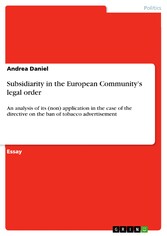Suchen und Finden
Subsidiarity in the European Community's legal order - An analysis of its (non) application in the case of the directive on the ban of tobacco advertisement
Mehr zum Inhalt

Subsidiarity in the European Community's legal order - An analysis of its (non) application in the case of the directive on the ban of tobacco advertisement
Essay from the year 2009 in the subject Politics - International Politics - Topic: European Union, grade: A-Grade with Distinction, South Bank University London (Faculty of Art and Human Sciences), course: European Policy, language: English, abstract: The subject of this essay is the implementation of the subsidiarity-principle in the EC's legal order. While EC-laws have supremacy over national laws and become a part of the national legal order, self-standing national laws are applicable where the EC has no legislative competence. In this aspect, the EC's system is comparable to e.g. the German federal system. The essay shows that the EC's legislative system balances the powers of the supranational and the national level by certain legal instruments: The principle of 'limited empowerment', the distinction between exclusive and competitive competences and the necessity of a 'legal basis' for every supranational legislative act. As their justiciability is essential for the lower levels' protection from power centralisation the Member States can litigate at the European Court of Justice against 'lack of competence' when the EC meddles in affairs for which it is not empowered. The theoretical implementation as well as the - sometimes unsatisfying - practical application of these instruments is illustrated on the examples of two EC-directives on the ban of tobacco advertisements and the German litigation against them for 'lack of competence'.
Alle Preise verstehen sich inklusive der gesetzlichen MwSt.




















